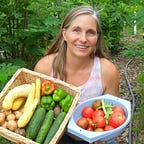3 things you need to grow food anywhere
I found a public access road to the beach near my Airbnb in Rincon, Peurto Rico. After learning my “garden escape” Airbnb wasn’t a gardener’s escape, after all, I started exploring nearby land.
I had no idea what to expect. Would I run into more vicious iguanas or get caught in a tarantulas web between two coconut trees? Seriously, imagine visiting an island you’ve never been to before where you encounter random dogs, cats, chickens, and iguanas daily. It’s 2020 — you never know what to expect.
One of the first things I discovered on this public land was a bucket. There wasn’t much debris or litter, but there was a clean 5-gallon bucket just randomly near the path. I brushed this off and kept going.
I found an empty plot, PERFECT for growing food!
Then I thought to myself, what’s the most important thing about guerilla gardening? Water, of course. Doesn’t matter if you’re going to garden in your backyard or window, you need fresh water for your plants for the entire growing season. There are times in Puerto Rico where my freshly planted seeds and plants need a little extra rain.
Luckily, there was a great stream of freshwater nearby that dumps into the ocean. This plot was, of course, perfect. I had the sun, soil, water, and even a bucket.
You might think I’m forgetting fertilizer, but did you know you don’t even have to go to the local store for fertilizer. You can enrich soil with 50 Common household wastes and other organic materials. All you have to do is eat a little healthy and you’ll be able to make your own fertilizer.
Plus, many scientists agree that chemical fertilizers are harming the environment (you certainly don’t want to use them on plants you intend to eat either . . .)
I’m Marjory Wildcraft, Founder & CEO of The Grow Network. Remember to follow me for more of my guerrilla garden and permaculture projects.
